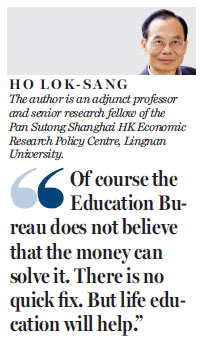Life education is desperately needed in the SAR's schools
Updated: 2016-03-30 08:15
By Ho Lok-Sang(HK Edition)
|
|||||||
I have been pleading for bringing life education to our schools for years. What exactly is life education?
Life education will give a person the strength to deal with hard times. Yes, life can be hard. Competition may be intense. Home prices may be unaffordable. Examinations can be tough. People get laid off. Regardless, we need to face this and tough it out. My parents' generation experienced much harder times: First the civil war on the Chinese mainland, then the Japanese occupation. They had lost many people close to them in the wars. They had to face hunger, danger and hardship and flee for their lives. But they endured all this.
Some people have ridiculed positive psychology. They say it is about being foolishly optimistic. But positive psychology is not about creating illusions. The positive way of thinking is about doing the best you can with limited resources. Adrian Anantawan, a Thai Chinese, was born without a right hand. But he still has a normal left hand and a right arm. With loving care from his parents and support from other loving people including ingenious technicians and engineers who designed a special gadget so he could grip the bow with his right arm, he trained and trained. After years of hard work he became a professional violinist. Then he decided to help other disabled students in their artistic development. With this noble intention, he went to Harvard Graduate School of Education. A documentary, The Story Behind the Notes, was created to tell his story.
Of course, there is no guarantee that such effort will always pay off so well. To think this would be foolishly optimistic. The point is: If you do not try, you will never know. Anantawan's story is a story about love, about insight (wisdom), about fortitude (resilience), and about engagement (purposive living), or "LIFE". His story is the embodiment of LIFE education.
Anantawan benefited from the love of others; he wanted to share what he has acquired with others. It is this love for other people that gives purpose and meaning to his life. It is his love for life and for others that gave him the impetus to keep working and realizing the potential life has offered him. It was wise of him to focus on what he still has rather than what he has not.
Since the current academic year began, more than 20 Hong Kong students have committed suicide. I don't think we have ever seen anything like this before. It is very sad. But what made me even sadder was the reaction of some commentators. One wrote: "This is an age of hopelessness. To preach positive thinking may not be positive." This person wrote that before a fully fledged study on student suicides is complete, it was silly of the Education Bureau to recommend "positive thinking", "building resilience", "keeping hopes alive". This was a biased and unenlightened view of the suicides and also of positive psychology.
Even if the external environment is bad, this does not mean people should give up hope. This is especially true of young people. They still have many years ahead of them. Giving up hope is giving up any chance that things may get better. The case of Jeremy Lin comes to mind. He kept training despite being dropped by two different NBA teams and seldom having the chance to play in a serious game. But then the chance came one day when the New York Knicks had to enlist him in a game since some major players had been injured. Lin seized the opportunity to put up a stunning show. If he had given up hope and not kept himself in shape, it could have been the end of his career.
The recent spate of student suicides is alarming, and shows that life education is badly needed. Yet when the Education Bureau decided to give HK$5,000 to each school in support of life education activities, it was criticized for believing that giving money could solve the problem. Of course the Education Bureau does not believe that the money can solve it. There is no quick fix. But life education will help.
In the mandatory liberal studies curriculum in secondary schools, "self and personal development" is one of the areas of studies along with "society and culture", and "science, technology, and the environment". One would have thought that life education would be included in self and personal development. But my own research shows that very few secondary students believe their schools offer life education.
One central message of life education is that nothing is more important than life itself. An education, a university degree, a career, money, home ownership, marriage, examination results, "rising to the top" are at most a means to enhance your life. Life is the end; all other things are just a means. Life is about courage and about fighting against the odds. A person has a successful life when he or she never gives up.

(HK Edition 03/30/2016 page7)